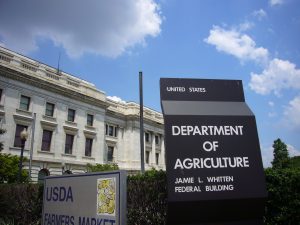 Six U.S. Department of Agriculture offices across the country were shuttered Tuesday due to anonymous threats against the facilities. The offices in Fort Collins, Colo.; Hamden, Conn.; Beltsville, Md.; Raleigh, N.C.; and Kearneysville and Leetown, W.Va. were affected. The closures are impacting an array of agencies and offices, including the Forest Service, Food Safety Inspection Service and the department’s inspector general. The agency’s headquarters in Washington, D.C., weren’t affected by the threats.
Six U.S. Department of Agriculture offices across the country were shuttered Tuesday due to anonymous threats against the facilities. The offices in Fort Collins, Colo.; Hamden, Conn.; Beltsville, Md.; Raleigh, N.C.; and Kearneysville and Leetown, W.Va. were affected. The closures are impacting an array of agencies and offices, including the Forest Service, Food Safety Inspection Service and the department’s inspector general. The agency’s headquarters in Washington, D.C., weren’t affected by the threats.
The federal facilities in five states were closed “until further notice” by officials citing safety concerns. According to USDA spokesman Matt Herrick, the threats were “concerning for the safety of USDA personnel and its facilities.” Federal Bureau of Investigation is working with the USDA to determine whether the threats are credible. White House spokesman Josh Earnest said that the USDA was also working with the Department of Homeland Security to ensure the safety of their offices and personnel. The USDA declined to describe the threats in detail.
Herrick said, “Personnel at these locations have been made aware of the threats and will not report to these offices until further notice.” USDA employees in the buildings closed have been given the option to telework or take administrative leave until the buildings have been cleared by law enforcement. Nationwide, the USDA has roughly 93,000 employees.
The affected facilities house agencies that inspect plant and animal health and food safety and perform research among other duties. The facilities also observe and report crop conditions throughout the growing season, guarantee loans for farmers to buy livestock and other commodities, and support water and sewer systems in rural areas.
The U.S. agriculture industry has long been considered a target for terrorists. U.S. and allied forces discovered al-Qaida training manuals in 2002 in Afghanistan that targeted agriculture. In a 2012 bulletin, the FBI discussed possible threats against U.S. agriculture that stated “terrorists consider America’s agriculture and food production tempting targets.” The bulletin focused on contamination of the U.S. food supply through “the deliberate introduction of an animal or plant disease for the purpose of generating fear, causing economic losses, or undermining social stability.”
